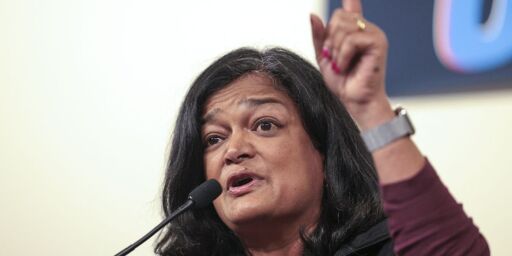Summary
House Democrats, led by Rep. Pramila Jayapal, introduced the We the People Amendment to overturn Citizens United, aiming to curb corporate influence in elections.
The constitutional amendment asserts that constitutional rights apply only to individuals, not corporations, and mandates full disclosure of political contributions.
Jayapal cited Elon Musk’s massive campaign spending and subsequent financial gains as proof of the ruling’s harm.
Advocacy groups praised the move, calling it necessary to combat corporate power and dark money in politics, but Republicans have not backed the proposal.



What did they do in 2021 instead?
Probably nothing else going on really. They’re just lazy and fat off corporate cash piles, obviously.
Nothing. That’s the problem. Democrats are so afraid to play an opposition party cause it will negatively affect party leadership and top donors. They want the status quo and are more than likely benefiting from the Trump regime in many ways.
Make no bones about it: top Democrats have been complacent with a hostile takeover of the US government because it is benefiting them.
Progressive Democrats and party newcomers are seeing this reality. They tried to play the game for a bit but got burned like Bernie did. Some democrats are finally growing a backbone to stand up against geriatric party leadership.
I mean, I’d make a few bones about it. The best time to be an excellent Progressive party is 50 years ago. The next best time is now, though.
Democrats make an opposition move
I’m surprised how quickly people forgot the very first bill the Democrats introduced in 2021 addressed this very topic. The Republicans in the senate killed it.
https://www.congress.gov/bill/117th-congress/house-bill/1
Passed House (03/03/2021) For the People Act of 2021
"This bill addresses voter access, election integrity and security, campaign finance, and ethics for the three branches of government.
Specifically, the bill expands voter registration (e.g., automatic and same-day registration) and voting access (e.g., vote-by-mail and early voting). It also limits removing voters from voter rolls.
The bill requires states to establish independent redistricting commissions to carry out congressional redistricting.
Additionally, the bill sets forth provisions related to election security, including sharing intelligence information with state election officials, supporting states in securing their election systems, developing a national strategy to protect U.S. democratic institutions, establishing in the legislative branch the National Commission to Protect United States Democratic Institutions, and other provisions to improve the cybersecurity of election systems.
Further, the bill addresses campaign finance, including by expanding the prohibition on campaign spending by foreign nationals, requiring additional disclosure of campaign-related fundraising and spending, requiring additional disclaimers regarding certain political advertising, and establishing an alternative campaign funding system for certain federal offices.
The bill addresses ethics in all three branches of government, including by requiring a code of conduct for Supreme Court Justices, prohibiting Members of the House from serving on the board of a for-profit entity, and establishing additional conflict-of-interest and ethics provisions for federal employees and the White House.
The bill requires the President, the Vice President, and certain candidates for those offices to disclose 10 years of tax returns."